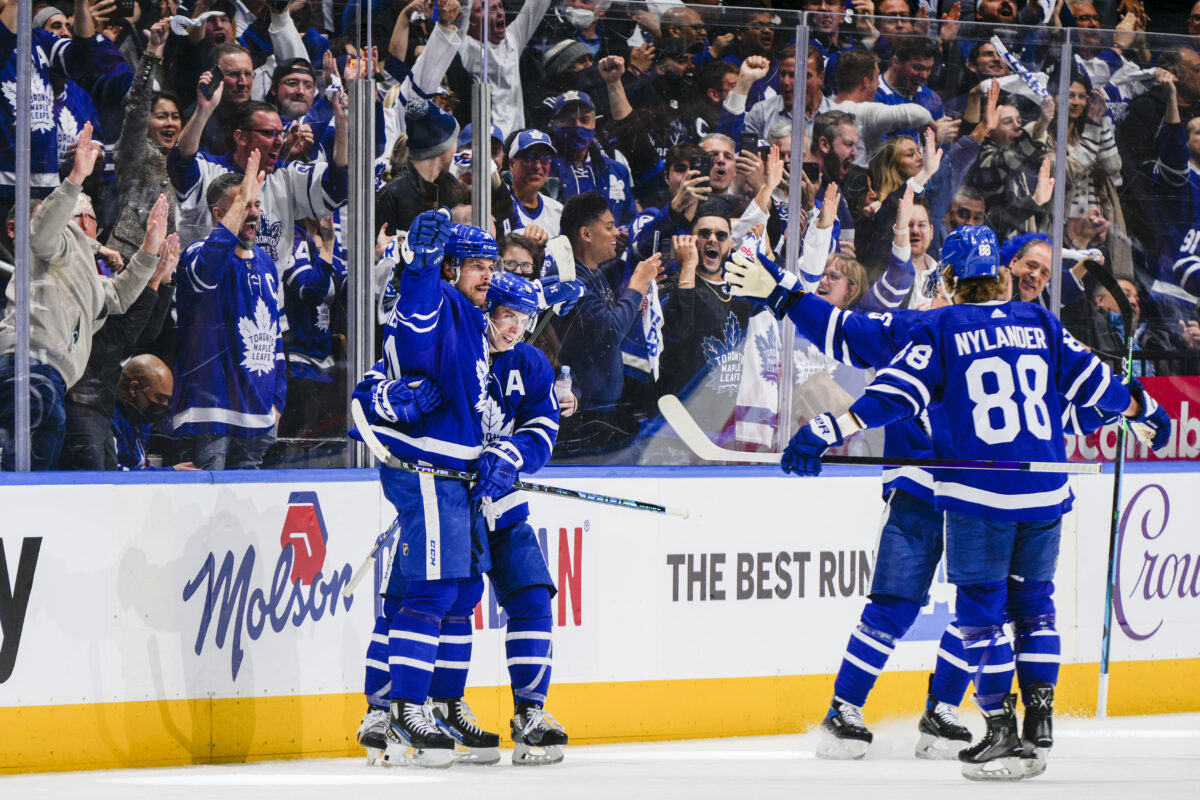For the most part, the names celebrated during any respective year’s NHL Awards don’t tend to surprise. After all, they are the athletes who performed best and earned their rightful spotlight. However, when it comes to discussing this season’s Calder Trophy, an irrational subjectivity is clouding some opinions. Perhaps that’s to be expected, although far from justified, given the circumstances surrounding the obvious frontrunner — Toronto Maple Leafs’ Michael Bunting.

It’s justifiable to leverage a player’s best qualities, in an effort to build a case for why they’re due for a respective accolade more than another. What’s not as logical, though, is looking to factors that are beyond the control of the respective athlete to rationalize why they aren’t as worthy.
The fact that Bunting is in his mid-20s, has three years of NHL experience, and played most of the season on one of hockey’s most potent lines, doesn’t diminish that he is most deserving of this specific acknowledgement. Nor does any of that make him less eligible than those he’s competing against.
RELATED: THW’s 2021-22 Predictions: Standings, Stanley Cup & NHL Awards
Simply stated, skeptics are relying on some fairly ridiculous reasoning when attempting to overshadow what Bunting accomplished through 2021-22. Meanwhile, all it takes is a little bit of context to dismantle such a stance.
Bunting Has Years of Professional Experience
Typically, there is a straightforward sequence of progression when it comes to witnessing an unproven prospect turn into a bonafide professional. Even if they only squeeze in a few sporadic appearances following their debut, if they are poised to turn pro then bypassing the confines of maintaining rookie status generally occurs soon thereafter.
That’s not how Bunting’s story goes. Drafted back in 2014, selected 117th overall by the Arizona Coyotes, the Canadian winger didn’t get his first taste of NHL action until mid-way through the 2018-19 schedule. Failing to find a way to stick with the Coyotes that season, he ended up playing in the American Hockey League for most of it.
Bunting didn’t gain any additional playing time with Arizona through 2019-20, but was able to crack their roster again late in their 2020-21 campaign. A sample size that worked to his advantage, as the Maple Leafs took notice and signed him to a two-year deal that offseason.
Regardless of the number of NHL schedules that he’s seen ice time within, only since joining the Maple Leafs has Bunting been able to accumulate the level of experience necessary to truly craft his Calder campaign.
Besides, last year’s winner played pro overseas for six years before making his mark in North America. Bunting, on the other hand, had a mere 26 NHL games noted on his resume prior to this season. The former should fuel debate far more than the latter.
He’s Too Old to Be Considered an NHL Rookie
Just because we generally see potential superstars between their late-teens to early 20s capture the Calder, doesn’t mean that is the only age bracket eligible for the award. Skeptics have to accept that being an exception to the norm is not enough to warrant disregard for a performance that otherwise fits right within the rulebook.
To be eligible for the Calder Memorial Trophy, a player cannot have played more than 25 games in any single preceding season nor in six or more games in each of any two preceding seasons in any major professional league. Beginning in 1990-91, a player must not have attained his 26th birthday by Sept. 15 of the season in which he is eligible.
Bunting just barely squeaked into 2021-22’s timeframe, having turned 26 on September 17, 2021. Regardless, he remained eligible as a result.
Using this topic as the rationale for why Bunting shouldn’t win a rookie-related award would be like telling a championship team that circumventing the salary cap voids the achievement. Both scenarios are to be accepted by onlookers, even though one isn’t nearly as obvious of a cheat as the other.
Playing With Marner & Matthews Was Advantageous
Bunting led all rookies in production with 63 points through 2021-22. Yet, that can be explained away because he logged over 600 minutes of ice time playing beside Auston Matthews and Mitch Marner, right? It’s not quite that simple.
Anyone lined up with Marner and Matthews would, therefore, appear to be in an advantageous position as a result. However, as we often witness in professional sports, just because certain names are expected to produce alongside one another doesn’t mean it always translates into real-world results. Cohesion matters.

To further illustrate that very point, let’s explore how a former teammate of Marner and Matthews fared when playing with the duo throughout this past season. Nick Ritchie, a more accomplished veteran than Bunting to this point in their careers, was on the ice with Toronto’s highest producing superstars for around 60:00 in 2021-22.
Dealing with drastically different sample sizes, it’s only right to compare results in relative terms. With Bunting to their left, Toronto scored 61 times to establish a rate of one goal per 10 minutes. To at least match that pace, Ritchie would have had to have been part of six such celebrations with Matthews and Marner. Yet, that particular group went goalless.
Bunting’s style of play, let alone his tenacity, proved to be far more complementary to Toronto’s top talent. Rather than claiming it was solely the influence of Marner and Matthews that made this trio a dominant one, Bunting deserves credit for contributing in a way that turned a solid tandem into a line feared throughout the league.
What’s more, being on the ice with Toronto’s most skilled meant that Bunting was forced to face every opponent’s best as well. Rather than recognizing his ability to effectively navigate through that level of competition, the wrong side of this argument fixates on an inaccurate narrative suggesting Bunting’s production was only thanks to his linemates. Meanwhile, all played a vital role in creating their collective success.
Bunting’s Performance Makes Him Most Deserving
There’s no denying that fellow finalists Moritz Seider and Trevor Zegras had tremendous seasons. Both persevered on teams unable to make it into this year’s postseason, each putting forth individual efforts worthy of much more.
20-year-old Seider averaged the highest ice time on his entire Detroit Red Wings roster, playing over 23:00 per night while racking up the most blocks on the team at 161. He also landed the second-highest number of hits with 151. Add his 50 points into the equation and it’s clear that this is a defenseman the Red Wings will be building around for years to come.
As far as making a case for Zegras, just look to any given night’s highlight reel to see why the 21-year-old was a sure bet for being named a Calder finalist. The excitement he was able to single-handedly infuse into every game was palpable. His creativity paid off, helping him accumulate 23 goals and 38 assists through 75 contests in 2021-22.
That all said, incorporating both the eye-test perspective and his point totals, Bunting was simply the best rookie of this bunch. He oozed a type of passionate confidence that saw him keep up against the league’s best. There is no denying that his 23 goals, 40 assists, and 63 points directly influenced Toronto’s ability to achieve record-setting success.
The fact remains, regardless of the scenarios that surrounded Bunting or the circumstances he found himself in, he qualified as a rookie through 2021-22. What’s more, he was the most productive and impactful of that group. Attempting to claim anything otherwise is beyond irrational.
RELATED: 3 Teams Maple Leafs Lucky to Avoid in 2022 Stanley Cup Playoffs
Will Bunting become only the second Maple Leaf since 1966 to capture the coveted Calder? Let’s hope that objective opinions make this more of a discussion than a debate.
You may also like:
- Maple Leafs Should Keep Murray as Third Goaltender
- Flames & Maple Leafs Trade History Revisited
- 3 Players the Maple Leafs Could Target on a PTO
- NHL Rumors: Oilers, Maple Leafs, Capitals, Kuznetsov News
- Maple Leafs Should Target Evgeny Kuznetsov as Reclamation Project
